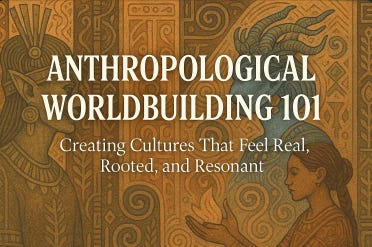Why does one fantasy world feel like a flimsy stage set, while another pulses with life, depth, and strangeness that lingers?
The difference often comes down to the presence of culture. Not just costumes and festivals, but the systems beneath them. How people relate to each other, how power flows, what is sacred, what is feared, what is never spoken of. This is the realm of anthropology, and it’s one of the most powerful, underutilized tools in a worldbuilder’s toolkit.
Welcome to Anthropological Worldbuilding 101, a new series where we’ll explore how anthropology (the study of human cultures) can transform your worldbuilding into something that feels real, rooted, and resonant.
“Fantasy is not primitive, but primal.”
Ursula K. Le Guin
Most worldbuilding advice starts at the top: rulers, wars, religions, maps, and magic systems. But if we begin with an anthropological lens, we start from the inside out. How people live. Their beliefs, habits, kinship ties, rituals, stories, taboos, objects, and roles. It's not about what’s grand. It’s about what’s meaningful.
In fantasy, this matters deeply.
If your invented cultures don’t have:
A way of marking identity
Traditions and rituals (mundane or magical)
Beliefs about life, death, and the unseen
A shared understanding of what is sacred and what is forbidden,
Then you’re missing the opportunity to create a world that feels inhabited rather than just invented.
In real-world anthropology, a group’s culture determines how humans make meaning out of chaos. Every taboo, gesture, myth, marriage rite, or funeral chant tells us something about how a people see the world, and themselves within it. Fantasy lets us reimagine that meaning.
In real-world anthropology, culture isn’t just decoration—it’s how human beings shape chaos into meaning. Culture is the framework that tells us what matters, what’s right or wrong, what’s sacred or mundane, and even what counts as “real.” It’s how we interpret death, love, birth, the stars, and the seasons. And we do it through ritual, story, taboo, kinship, and symbols.
When a community celebrates a marriage, they aren’t just throwing a party—they’re reinforcing beliefs about union, lineage, gender roles, and spiritual responsibility. A funeral chant might reflect beliefs about the soul’s journey, or the role of memory in holding a person in the world. Even something as small as a gesture of greeting… a bow, a hand over the heart, or the avoidance of eye contact tells a story about hierarchy, community, or spiritual balance.
Anthropology teaches us to look beneath the surface and ask, Why is this done? What is being communicated? Who benefits from this belief, and who is excluded by it?
Fantasy gives us the thrilling ability to reimagine all of that.
We can build cultures where grief is considered a sacred performance, and the louder your mourning, the more honored the dead. Magic is transferred through naming, so names are guarded like treasure. Taboo foods are tied to ancestral curses, not dietary laws. Children are raised communally because magic only manifests when trust networks are strong.
You can build a society where naming someone has literal power over them. Time is measured not by hours, but by moon phases and ancestor dreams, and kinship is determined by whose spirit guards your doorway, not who gave birth to you. Fantasy lets us take the building blocks of real human culture and remix them with intention. To create not just exotic backdrops, but living societies with their own logic, mystery, and soul. And when we do this well, our stories don’t just entertain. They resonate because even in the strangest world, readers can feel the familiar shape of meaning trying to rise from the chaos.
Over the next Worldbuilding Wednesdays, we’ll explore topics like:
Kinship systems beyond the nuclear family
Magical rituals and rites of passage
Taboos, purity laws, and sacred spaces
Founding myths and oral storytelling
Power structures, caste systems, and magical hierarchies
Daily life and material culture
Language, worldview, and naming magic
Ethical cultural creation (vs. appropriation)
You don’t need a degree in anthropology. You just need curiosity.
Coming Next:
“Mothers, Uncles, and Magical Heirs: Rethinking Fantasy Families”
We’ll dive into kinship systems that go far beyond blood, and why the nuclear family is optional in fiction but often defaulted to in fantasy.
#Fantasy #worldbuilding #anthropology #WorldbuildingWednesday





Very excited to learn in the coming Wenesdays
Good article!